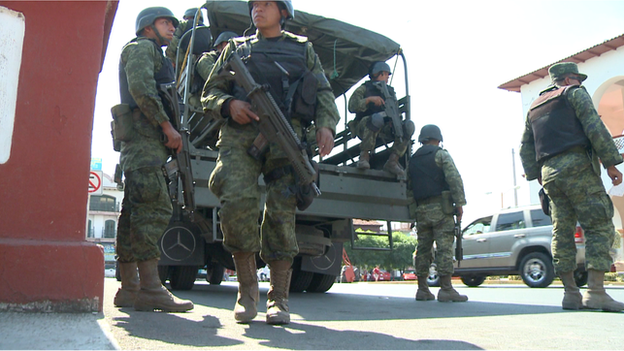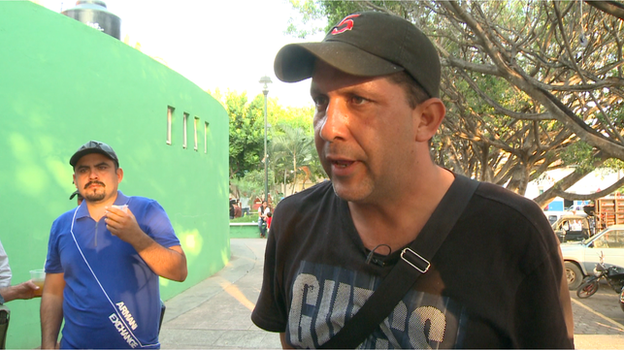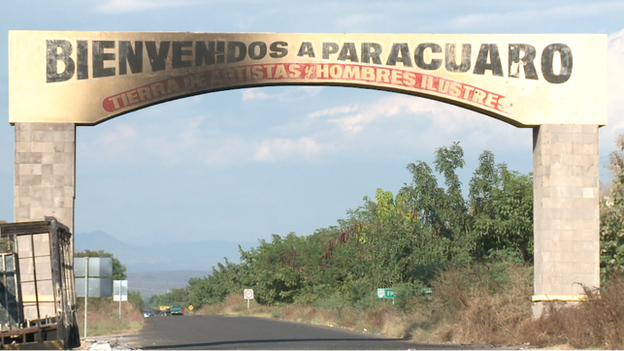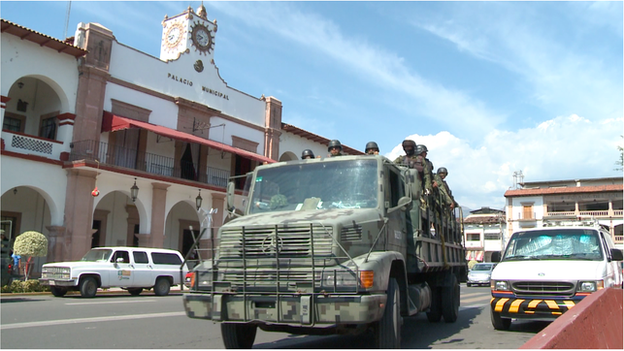Michoacan: Mexico's failed state?
- Published
BBC's Will Grant: "Year of brutal rule by drug gangs has left public institutions in tatters"
Michoacan, the Mexican state where troops were first deployed in 2007 to tackle the drug gangs, is in danger of spiralling out of control.
Vigilante groups armed with high-powered weapons of questionable origin have pushed out a powerful drug cartel, the Knights Templar, from some of their key footholds in a region called Tierra Caliente.
As the retreating drug cartel members fled towards the town of Apatzingan, they burned lorries and set up roadblocks along the main highway.
Meanwhile the army, sent in to restore order and disarm the self-defence forces in the town of Antunez, opened fire, killing at least two villagers.
There have also been repeated arson attacks in Apatzingan, presumably by drug gang members, right under the noses of the scores of military personnel and federal police patrolling the city.

Mexico's army seem unable to stop arson attacks by the drug cartels.
'Poor administration'
"This is a failed state," says Comandante Cinco, a self-defence leader in the village of Paracuaro.
He says the community militias emerged because people were tired of paying extortion money to the drug cartels while local police did nothing to protect them.
Worse still, many officers were in the pay of the cartel.
The streets of Paracuaro are now firmly in the vigilantes' hands. Young men who until recently picked lemons and avocados for a living are getting acquainted with their new handguns and automatic rifles.
The entire village has turned out in the main square to hear the self-defence forces explain their plan for the future now that the cartel have been run out of town.
Some townsfolk are fearful of simply replacing one group of unknown armed men with another. Other people are holding up placards thanking the self-defence forces for taking on the Knights Templar.

Comandante Cinco says local people are tired of paying extortion money to drug cartels
On stage, Comandante Cinco gets straight to the point:
"The self-defence forces are not paramilitaries," he shouts to applause from the crowd. "You are all self-defence members too!"
Optimistic
But while the vigilantes undoubtedly enjoy public support in the region of Tierra Caliente for the time being, the question now is whether they will be prepared to give up their weapons when the time comes.
Comandante Cinco insists that will happen sooner rather than later.
"At the rate we're going, I think that in two months we will have cleared the state of Knights Templar and we'll all go home."
"We've only been here for ten days and already people feel free, businesses are returning to normal. In two months, the state of Michoacan will be clean."
For most, though, that is an optimistic estimate.

Paracuaro ("land of artists and illustrious men") is now in the hands of anti-cartel vigilantes

The Mexican military are a visible presence on the streets of Apatzingan
'Compromised'
In Apatzingan most shops are staying closed until the tension eases a little. The economy in the town, as well as elsewhere in Michoacan, is taking a battering.
Meanwhile the church now has entered the fray. The Bishop of Apatzingan, Miguel Patino, has also previously described the state as failed. Now he has published an open letter criticising the government's response to the crisis.
"The problem we have is that often we can't find any guarantee of security among our local authorities because they are compromised by the enemies of peace," the bishop told the BBC in the cathedral in Apatzingan.
"That's a serious problem because who can we turn to?"
On Wednesday, the Mexican government appointed a new security chief for the state, Alfredo Castillo, tasked with the unenviable mission of restoring stability.
The government of President Enrique Pena Nieto has repeatedly denied that it has lost its grip on Michoacan despite several troop surges in the state in the year since he came to office.
Speaking to the BBC shortly before the latest crisis unfolded, the head of the federal police, Francisco Galindo Ceballos, rejected the bishop's description of the western state as "failed".
"The government of Michoacan is in place. It's stable. It's governing. The municipal governments and the mayors are working too.
"So I don't share this point of view that the state has been lost."
His opinion is unlikely to have changed much since this latest push by the self-defence forces, as the Pena Nieto administration is trying to show a united front on what is a highly complex situation.
For most citizens caught in the stand-off, the question of whether or not the state has failed is perhaps academic. Certainly, they see it as failing.
In his open letter, the Bishop of Apatzingan asked rhetorically: "Can't [the army and the government] see we're in a state of need?"
Whether he meant in need of security, in need of peace or in need of a respite from the fighting, most of his parishioners would agree.
- Published15 January 2014
- Published14 January 2014
- Published13 January 2014
- Published10 February 2014